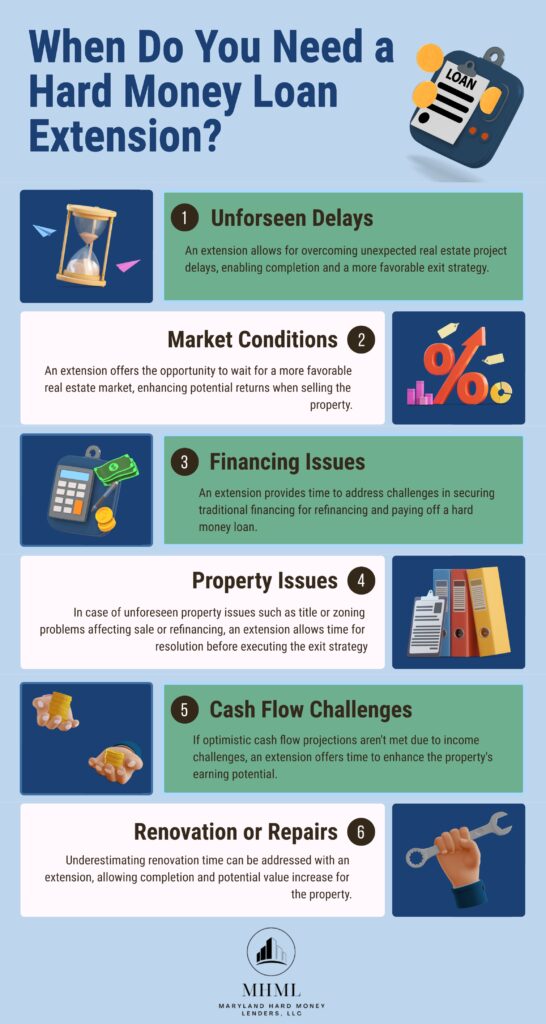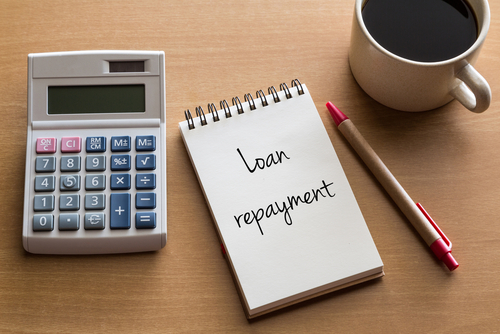Do You Need a Hard Money Loan Extension?
Hard money loans are an excellent way for investors to obtain quick, short-term financing. However, what if something comes up and you’re unable to pay off the loan right away? Most lenders allow you to extend the loan past the due date, so you can finish up fix-and-flip renovations or secure long-term financing. In today’s article, we’ll discuss when to request a hard money loan extension, how to talk to your lender, and strategies for repaying your hard money loan.

Contents of This Article:
- What Is a Hard Money Loan Extension?
- When Should You Request a Hard Money Loan Extension?
- How to Ask Your Lender for an Extension
- Strategies for Repaying Your Hard Money Loan
- How to Find the Right Lender for Your Project
What Is a Hard Money Loan Extension?
Sometimes, things don’t go as planned with certain investment properties. As such, you may need a hard money loan extension to finish renovations or secure long-term financing.
When borrowers obtain real estate loans in Maryland, they agree to a specific repayment timeline, often ranging from a few months to a couple of years. However, there may be scenarios where borrowers might need more time to repay the loan due to unforeseen circumstances.
As such, a hard money loan extension allows the borrower and the lender to mutually agree to extend the original loan term. This means the borrower is given more time to meet their repayment obligations. With that, the loan terms are typically renegotiated between the borrower and lender.
Remember that while a hard money loan extension can temporarily relieve borrowers, it may result in additional costs, like fees or higher interest rates. As such, borrowers should consider their financial situation carefully and consult with their lenders before seeking an extension. Next, we’ll review some instances where you may need to request a hard money loan extension.
When Should You Request a Hard Money Loan Extension?
Requesting a hard money loan extension is a decision that should be made carefully and strategically. For instance, borrowers may consider extensions when they face challenges in repaying the loan within the original agreed-upon timeframe. As such, here are some situations when you might consider requesting a hard money loan extension.

- Unforeseen Delays
- Market Conditions
- Financing Issues
- Property Issues
- Cash Flow Challenges
- Renovation or Repairs
Unforeseen Delays
Sometimes, unforeseen delays in your real estate project may prevent you from selling or refinancing the property as planned. In that instance, an extension could give you the necessary time to complete the project and secure a better exit strategy.
Market Conditions
If the real estate market is unfavorable or experiencing a downturn, selling the property at the expected price might be difficult. In turn, an extension could allow you to wait for more favorable market conditions to maximize your returns.
Financing Issues
If you were planning on refinancing the property to pay off the hard money loan but encountered difficulty securing traditional financing, an extension could give you the time needed to resolve those issues.
Property Issues
An extension may be necessary if unexpected property-related problems hinder your ability to sell or refinance, like title issues or zoning problems. That way, you can address those issues before proceeding with your exit strategy.
Cash Flow Challenges
Perhaps your initial cash flow projections were overly optimistic, and you’re facing challenges generating the expected income. In that case, an extension could provide additional time to improve the property’s income potential.
Renovation or Repairs
You may also underestimate the time required for renovations or repairs. An extension could give you the time needed to complete the work and potentially increase the property’s overall value.
How to Ask Your Lender for an Extension
Asking your lender for a hard money loan extension requires clear and professional communication. As such, when considering requesting an extension, you’ll want to remember the following tips.
- Prepare Your Request- First, review your loan agreement to understand the terms and conditions, including any provisions related to extensions. Additionally, determine the specific reasons for requesting your extension.
- Communicate With Your Lender- Maintain open and transparent communication with your lender. Explain your situation, the reasons for the extension request, and how you plan to address the challenges you’re facing.

- Present a Viable Plan- Present a clear and realistic plan for how you intend to resolve the issues that led to the extension request. After all, lenders may be more likely to grant extensions if they see a well-thought-out plan.
- Recognize New Loan Terms- Be prepared for potential changes to the loan terms if the extension is granted. This may include higher interest rates, fees, or other adjustments.
- Provide Documentation- Provide documentation that supports your reasons for requesting an extension. For instance, you may show project updates, financial statements, market research, or other relevant information.
- Outline Your Exit Strategy- Clearly outline your new exit strategy, including how you plan to repay the loan after the extension period.
Strategies for Repaying Your Hard Money Loan
Repaying your hard money loan is essential to avoid default and maintain a positive relationship with your lender. However, remember that repaying a hard money loan can be demanding due to shorter loan terms and higher interest rates. If you’re unsure how to repay your loan or want to avoid an extension at the end of your loan term, here are some strategies for repaying your loan efficiently.
- Plan Ahead- Coming up with a plan from the start will help you stay on track. So, before taking out a hard money loan, create a comprehensive repayment plan with a timeline, budget, and projected income.
- Generate Income- Focus on quickly generating income from the property, whether it’s through selling, renting, or other means. After all, the sooner you generate revenue, the quicker you can repay the loan.

- Refinance- If applicable, find a way to refinance your loan at the end of the term, whether with a traditional mortgage or another form of financing.
- Prioritize Payments- Make repaying your hard money loan a top financial priority. For instance, allocate a significant portion of your property’s income toward loan payments.
- Communicate- Maintain open communication with your lender. If you encounter any challenges in making payments, inform them promptly so they can offer guidance or potential solutions.
- Avoid Taking on New Debt- Avoid taking on new debt during the repayment period of your hard money loan. After all, it may strain your financial situation and make it harder to meet your loan obligations.
- Accelerate Payments- If your loan terms allow, consider making extra payments whenever possible to reduce the principal balance faster and decrease overall interest payments.
- Plan Your Exit Strategy- From the start, have a clear and well-researched exit strategy for repaying the loan. This may involve selling the property, refinancing your loan, or another method to pay off the loan.
How to Find the Right Lender for Your Project
If you’re looking to get a hard money loan for your next project, finding the right lender is important. Start locally and find someone with enough expertise and flexibility to offer you a mutually beneficial loan deal. If you’re in Maryland, contact one of our experts here at Maryland Hard Money Lenders. We can help you get started with a hard money loan and ensure you get the funding you need for your real estate project. If something comes up and you need more time, we’ll work with you on a hard money loan extension. So, contact us today or get started now by filling out our hard money loan application.



